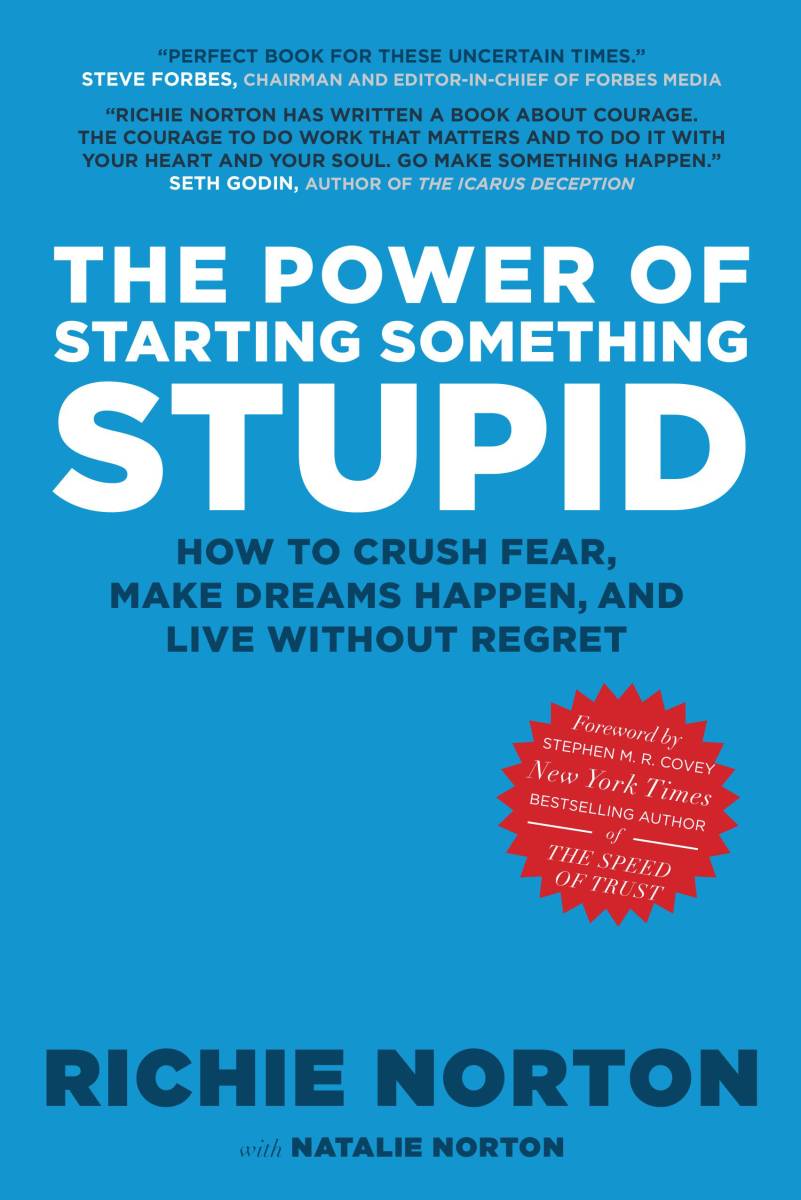 “The Power of Starting Something Stupid” by Richie Norton
“The Power of Starting Something Stupid” by Richie Norton
Shadow Mountain, 2013. Hardcover and electronic formats and audio book. 320 pages.
Believe it or not, the stupid ideas are the ones that influence our lives regularly. To name a few: the Wright Brothers and their flying machine, Henry Ford and his horseless carriage, Alexander Graham Bell and his telephone, Thomas Edison and who knows how many inventions, Marconi and the radio, Philo T. Fransworth and his television, satellites, the personal computer, cell phones, smart phones, Elvis Presley, the Beatles, and Walt Disney, who was told he had no talent. In one way or another, these and so many other “stupid” ideas affect our lives daily. We look back now on these things and say, But those things are so useful, and I couldn’t live life without them.” But back in their day, all of these were considered stupid and useless. But the people behind them had a vision that others couldn’t see, and they followed that vision and did “stupid” things that changed the world.
In “The Power of Starting Something Stupid,” speaker, entrepreneur, and author Richie Norton issues a challenge to all of his readers and those who would like to change their lives: Start something stupid, because life is too short not to do something. As he says repeatedly throughout the book, “Start to live, live to start.” It’s what he calls Gavin’s Law.
Gavin’s Law is named after his deceased brother-in-law, who died at twenty-one, and Richie’s son, who was named after his late uncle and only lived seventy-six days.
Because you never know when you’ll leave this life, you need to start living.
Norton calls stupid the new smart.
To illustrate, he shares the story of Clay Leavitt (when I saw the name, I wondered if it was the same Clay Leavitt I knew in Italy thirty-four years ago, and turns out it is) who was teaching English in Japan and saw the kids wearing old, faded jeans. Before long, Clay had convinced some friends to start collecting old jeans and soon they were selling them in Japan and Europe, and made a nice chunk of change.
As Norton explains:
“Let me whisper a secret directly into your ear. If someone thinks that your ideas, or the changes you want to make, or the dreams bubbling up inside of you, are stupid, welcome to the Club. You’re in the company of the world’s leading innovators, change agents, entrepreneurs, intrapreneurs, philanthropists, executives, employees, educators, youth, moms, dads, families, philosophers, mentors, and more. …
Maybe the smartest people in the world know something we don’t. Maybe they know that in order to be smart, in order to make significant contributions to the world, in order to spur significant change in their own lives, they sometimes have to act on ideas that others might initially perceive as stupid. …
Stupid as the New Smart . . . is healthy and should be sought after, and embraced. Stupid as the New Smart is that pressing thought that just won’t go away. The nagging hunch, that golden idea, that lofty dream, that if it weren’t so seemingly ‘stupid’ might actually have the chance to become something truly significant–in your own life, and quite possibly, the world at large.” (Pp 21-22)
Stupid as the new smart is having that gut-level feeling that your wildly stupid idea will work despite what everyone says. People wanted to lock up Marconi and called Henry Ford crazy. But be careful, one of the points of the book is to always be changing, seeing the next “stupid” idea and rushing to embrace it with the same fervor you did the first one and not getting stuck. Henry Ford was riding high with the most successful company in America, but he only built the Model T. When his engineers surprised him with a new, updated version, he literally kicked it to pieces, declaring the Model T was the only way to go. It wasn’t till Dodge and GM starting eating his lunch, and Ford Motor Company was on the verge of bankruptcy that he began to embrace change the way he had initially gone after his horseless carriage.
Norton lays out his plan for “The Power of Starting Something Stupid” in four sections: “Stupid is the New Smart,” “The Time has Come,” The Business of Stupid,” and “Making it Happen.” As he moves you through these, he uses anecdotes, studies, and experiences from his own life as well as those of other people’s to illustrate how to overcome things such as the “T.E.M.—Time, Experience, Money”–excuse. He also deals with procrastination: even Nobel Prize winners procrastinate. (“Procrastination is the grave in which opportunity is buried.” P. 161) Another interesting tidbit that popped up about procrastinating is that procrastinators actually don’t live in the future; they live so much in the present, the future almost doesn’t exist, as it were, or they incorrectly estimate the time things will take for them. One thing to do for overcoming procrastinating is break big projects down into smaller, easier-to-finish projects.
Then there is being authentic: doing what’s in your heart to the best of your ability, not what others tell you to do. That kind of authenticity generates energy and enthusiasm.
For me the most interesting was his START approach to starting your “stupid” new life.
Serve
Find ways to genuinely serve people with no thought of return, and you’ll be surprised what happens.
Thank
Always have a grateful attitude, and thank people.
Ask
Ask yourself is this what you want to be doing the rest of your life, and ask others for help in doing what you want to do. “A simple but effective way to become who you want to become or go where you want to go is to ask for directions from those who have already been there.” (Page 219)
Receive
Be a gracious recipient of help or favors; be open to receiving gifts from others. “When we graciously receive from others, everyone wins. Maybe not in such immediate, or obvious ways, but our willingness to receive from another blesses both the giver and the receiver. … Accepting a gift is a transaction. Receiving a gift means you run with it and score” (Pp 229, 231).
Trust
Trust yourself and your ideas, and trust that others will do good things. Trust that there are people smarter than you and that you can learn from them. He quotes Stephen M.R. Covey, who says, “Don’t let the 5% or 10% you can’t trust tell about that 90% or 95% you can trust.”
The field of self-help books is huge, and it’s easy to get overwhelmed. I have a few authors I trust: Zig Ziglar, Stephen R. Covey, and John McCormack, to name a few. Norton has received glowing endorsements for “The Power of Starting Something Stupid” from some of the biggest names in the business such as Jack Canfield, Brian Tracy, Andy Andrews, and Steve Forbes. These are people who have reputations and don’t readily endorse every book that comes down the road. They can’t risk their reputations endorsing everything that comes along.
I found Norton’s style to be easy to read and energetic, and “The Power of Starting Something Stupid” is a quick read. He asks some serious questions here about what we want to do with our lives and then gives answers. No, they aren’t always easy, but then neither is living a life you neither want nor like. This is going on my “trusted” list. I look forward to more from Norton so I can put his books next to Ziglar’s and Covey’s.





I liked this because I think it gives everyone encouragement to try things, even those things we think are “stupid.” I think I can use this in my classroom, too. It will be a good motivator for pre-teens! Thanks for bringing this book to my attention.
Just found this review of my book. Great job. Thank you so much! Means the world. You rock. Keep starting something stupid!